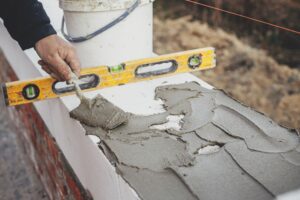Hiring a contractor
At Shield Foundation Repair, we spend an enormous amount of time and effort making sure our customers are dealing with a company that meets or exceeds the highest industry and government standards.
When you choose Shield for your project, you can be confident you’re dealing with a professional organization that not only knows its craft, but also puts the safety of our employees and customers at the forefront. We practice and train, and prepare, and train some more. We put the time in so that
every customer can have the confidence they’re dealing with a company that takes their property as seriously as they do themselves.

But don’t take our word for it. When looking for a contractor for your project, no matter how big or small, you need to do some homework first. Finding the right company you can feel confident will do the job right is hard.
Here are some steps you should take when hiring a contractor:
1. Get Recommendations
Start with your friends, co-workers, and family. You can also talk with a building inspector, who will know which home renovation contractors routinely meet code requirements. Do a Google search and check reviews of the companies you’re considering. What do other customers say?
2. Do Phone Interviews
Once you’ve assembled a list, we recommended that you make a quick call to each of your prospects and go through these questions to ask a contractor:
Do they take on projects of your size?
Do they specialize in the type of work you’re looking to contract?
Are they willing to provide financial references, from suppliers or banks?
Can they give you a list of previous clients?
The answers to these questions will reveal the company’s availability, reliability, how much attention they’ll be able to give your project and how smoothly the work will go.
3. Conduct In-person Interviews
This is your chance to get to know the candidates and their work. Take notes at each meeting so you can compare responses and narrow your list.
Questions may include the following:
- How long have you been in business?
- What kind of work is your specialty?
- Do you have experience working on similar projects?
- Will you use your own crew or hire a subcontractor for part of the job?
- Do you anticipate any problems? How will you deal with them?
- What kind of work schedule will you follow?
- How and when do you clean up? How do you deal with fine dust?
- Do you have workers’ compensation and liability insurance?
- Will you get the required work permits for my project? What are they?
- What kind of warranty do you provide and what does it cover?
- Do you provide a written contract?
- May I contact some of your past clients as references?
A contractor who can’t or won’t answer your questions may not be the right person for the job. Never sign anything until you’ve decided who you want to hire.
4. Check the Contractors’ References
To finalize your shortlist, call the references for each contractor. Ask about their experience with the contractor and about the work itself.
Questions may include the following:
- Did the contractor keep you informed throughout the project?
- Were you satisfied with the quality of work?
- Were there any problems?
- Did the project finish on schedule?
- Did the contractor stay within the originally quoted budget?
- Would you use this contractor again?
5. Request Detailed Estimates
Be specific about your vision for the project when asking for a detailed written estimate. The cost of a project can vary depending on the type, quality, and brand of materials.
Three detailed estimates are usually enough for you to make an informed decision.
Estimates should include:
- a description of the work required to complete the job
- how long the project will take
- how much the project will cost
Review the estimates to make sure everything you asked for is included. Assume that anything not specifically listed in the estimate will involve extra costs and extra time.
As such, it’s unwise to simply choose the estimate that offers the lowest price.
6. Ask for a Written Contract
Once you’ve chosen a contractor, make sure you get a written contract. This will protect you from losing your deposit, ending up with low-quality work or paying more than you expected.
The contract should include:
- a construction schedule with a start and end date
- a precise description of the work you want done
- everything you’ve been promised for the agreed-upon price
- when payment is expected
7. About deposits
Contractors can not ask for a deposit unless there are licensed and register with consumer and corporate affairs. Deposits are typically limited to 10%. Shield Foundation Repair can direct you to a website where you can search contractors and confirm if they are registered.
8. Other things to consider
- Make sure the contractor isn’t working from their home.
- Check and confirm if the contractor is registered with a safety program.
- No contractor can excavate without following OHS regulations and calling before they excavate to locate utility lines.
At Shield Foundation Repair, we’ll always be happy to provide all the information above, and answer any questions you have. Our top priority is always to ensure the our clients are 100% satisfied so openness and clear communication are crucial.
If you have any foundation or water ingress issues, get in touch today and put us to the test!





